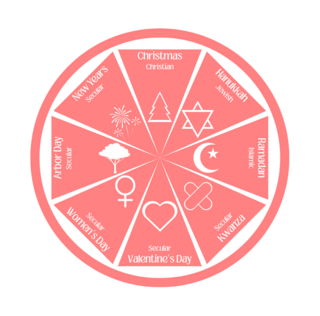
Blue laws, also known as Sunday laws, Sunday trade laws and Sunday closing laws, are laws restricting or banning certain activities on specified days, usually Sundays in the western world. The laws were adopted originally for religious reasons, specifically to promote the observance of the Christian day of worship, but since then have come to serve secular purposes as well.

Boxing Day is a holiday celebrated after Christmas Day, occurring on the second day of Christmastide. Boxing Day was once a day to donate gifts to those in need, but it has evolved to become a part of Christmas festivities, with many people choosing to shop for deals on Boxing Day. It originated in the United Kingdom and is celebrated in several Commonwealth nations. The attached bank holiday or public holiday may take place on 28 December if necessary to ensure it falls on a weekday. Boxing Day is also concurrent with the Christian festival Saint Stephen's Day.

A holiday is a day or other period of time set aside for festivals or recreation. Public holidays are set by public authorities and vary by state or region. Religious holidays are set by religious organisations for their members and are often also observed as public holidays in religious majority countries. Some religious holidays, such as Christmas, have become secularised by part or all of those who observe them. In addition to secularisation, many holidays have become commercialised due to the growth of industry.
Public holidays in Australia refer to the holidays recognised in law in Australia. Although they are declared on a state and territory basis, they comprise a mixture of nationally celebrated days and holidays exclusive to the individual jurisdictions.

Customs and regulations for shopping hours vary between countries and between cities.
These are the public holidays observed in Ireland. Public holidays in Ireland may commemorate a special day or other event, such as Saint Patrick's Day or Christmas Day. On public holidays, most businesses and schools close. Other services, for example, public transport, still operate but often with reduced schedules.
In the Catholic Church, holy days of obligation are days on which the faithful are expected to attend Mass, and engage in rest from work and recreation, according to the third commandment.

In the United States, public holidays are set by federal, state, and local governments and are often observed by closing government offices or giving government employees paid time off. The federal government does not require any private business to close or offer paid time off, as is the case for most state local governments, so employers determine which holidays to observe.

The Constitution of the Czech Republic is the supreme law of the Czech Republic. The current constitution was adopted by the Czech National Council on 16 December 1992. It entered into force on 1 January 1993, replacing the 1960 Constitution of Czechoslovakia and the constitutional act No. 143/1968 Col., when Czechoslovakia gave way to the Slovak Republic and the Czech Republic in a peaceful dissolution.

Public holidays in New Zealand consist of a variety of cultural, national, and religious holidays that are legislated in New Zealand. Workers can get a maximum of 12 public holidays and a minimum of 20 annual leave days a year.
Public holidays in Croatia are regulated by the Holidays, Memorial Days and Non-Working Days Act.
Sunday shopping or Sunday trading refers to the ability of retailers to operate stores on Sunday, a day that Christian tradition typically recognises as a day of rest. Rules governing shopping hours, such as Sunday shopping, vary around the world but many countries and subnational jurisdictions continue to ban or restrict Sunday shopping, such as Poland. In the United States, rules are enshrined within Blue laws.

Saint Andrew's Day, also called the Feast of Saint Andrew or Andermas, is the feast day of Andrew the Apostle. It is celebrated on 30 November. Saint Andrew is the disciple in the New Testament who introduced his brother, the Apostle Peter, to Jesus, the Messiah.

Rizal Day is a Philippine national holiday commemorating life and works of José Rizal, a national hero of the Philippines. It is celebrated every December 30, the anniversary of Rizal's 1896 execution at Bagumbayan in Manila.
In the United Kingdom, public holidays are days on which most businesses and non-essential services are closed. Many retail businesses do open on some of the public holidays. There are restrictions on trading on Sundays, Easter Day and Christmas Day in England and Wales and on New Year's Day and Christmas Day in Scotland. Public holidays defined by statute are called bank holidays, but this term can also be used to include common law holidays, which are held by convention. The term "public holidays" can refer exclusively to common law holidays.
The weekdays and weekend are the complementary parts of the week devoted to labour and rest, respectively. The legal weekdays, or workweek, is the part of the seven-day week devoted to working. In most of the world, the workweek is from Monday to Friday and the weekend is Saturday and Sunday. A weekday or workday is any day of the working week. Other institutions often follow this pattern, such as places of education. The constituted weekend has varying definitions, based on determined calendar days, designated period of time, and/or regional definition of the working week. Sometimes the term "weekend" is expanded to include the time after work hours on the last workday of the week.

Public holidays in Botswana are largely controlled by government sector employers who are given paid time off. The government holiday schedule mainly benefits employees of government and government regulated businesses. At the discretion of the employer, other non-federal holidays such as Christmas Eve are common additions to the list of paid holidays.

Alcohol laws are laws relating to manufacture, use, being under the influence of and sale of alcohol or alcoholic beverages. Common alcoholic beverages include beer, wine, (hard) cider, and distilled spirits. Definition of alcoholic beverage varies internationally, e.g., the United States defines an alcoholic beverage as "any beverage in liquid form which contains not less than one-half of one percent of alcohol by volume". Alcohol laws can restrict those who can produce alcohol, those who can buy it, when one can buy it, labelling and advertising, the types of alcoholic beverage that can be sold, where one can consume it, what activities are prohibited while intoxicated, and where one can buy it. In some cases, laws have even prohibited the use and sale of alcohol entirely.

The economics of Christmas are significant because Christmas is typically a high-volume selling season for goods suppliers around the world. Sales increase dramatically as people purchase gifts, decorations, and supplies to celebrate. In the U.S., the "Christmas shopping season" starts as early as October. In Canada, merchants begin advertising campaigns just before Halloween, and step up their marketing following Remembrance Day on 11 November. In the UK and Ireland, the Christmas shopping season starts from mid-November, around the time when high street Christmas lights are turned on. In the United States, it has been calculated that about one fifth of retail sales to one quarter of all personal spending takes place during the Christmas/holiday shopping season. Figures from the U.S. Census Bureau reveal that expenditure in department stores nationwide rose from $20.8 billion in November 2004 to $31.9 billion in December 2004, an increase of 54 percent. In other sectors, the pre-Christmas increase in spending was even greater, due to a November through December buying surge of 100% in bookstores and 170% in jewelry stores. In the same year employment in American retail stores rose from 1.6 million to 1.8 million in the two months leading up to Christmas. This means that while consumers might spend more during this season, they also are given increased employment opportunities as sales rise to meet the increased demand.













